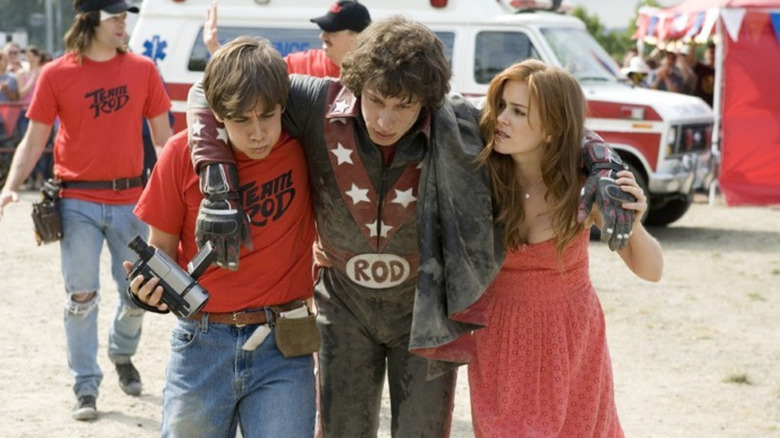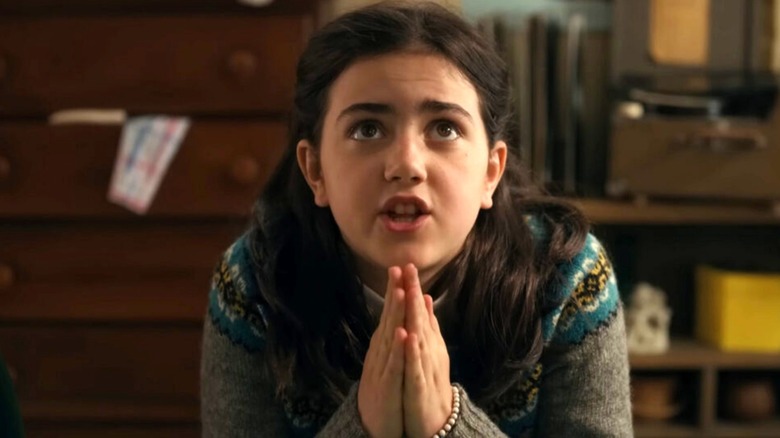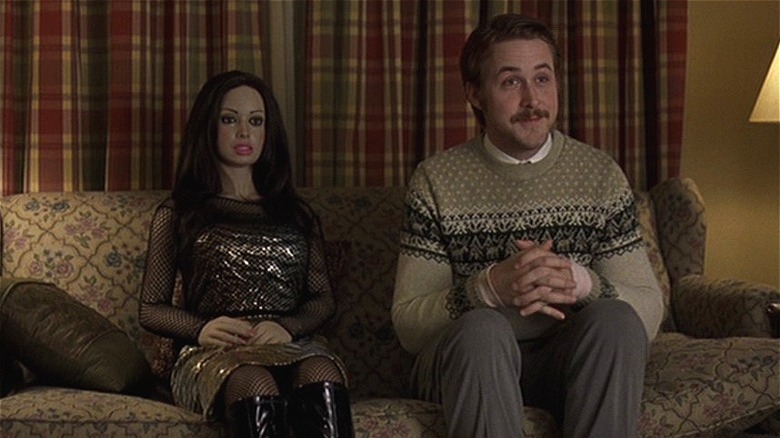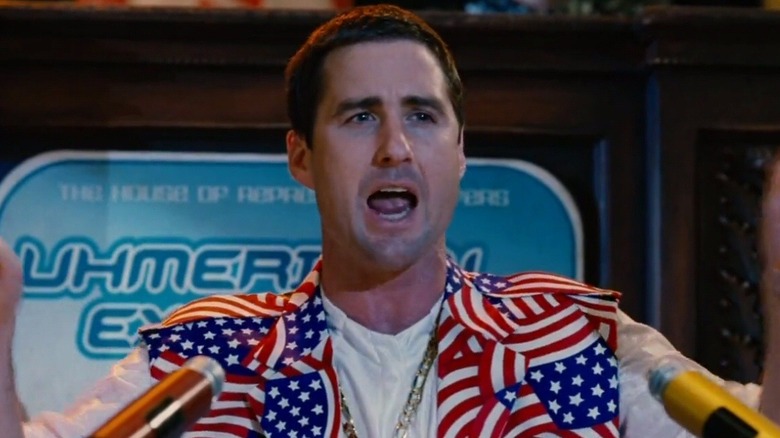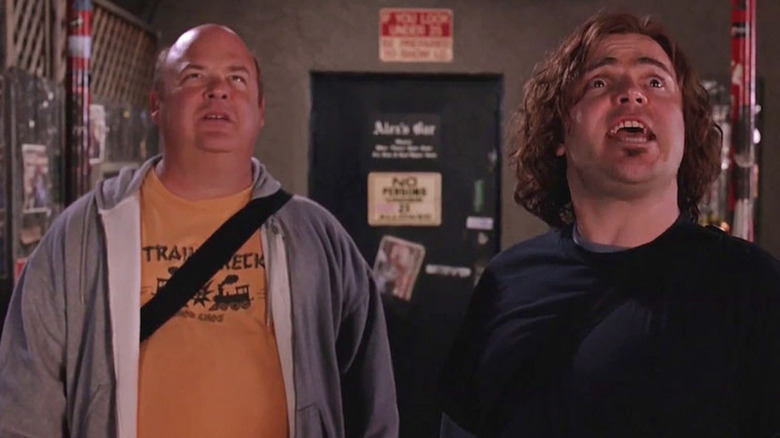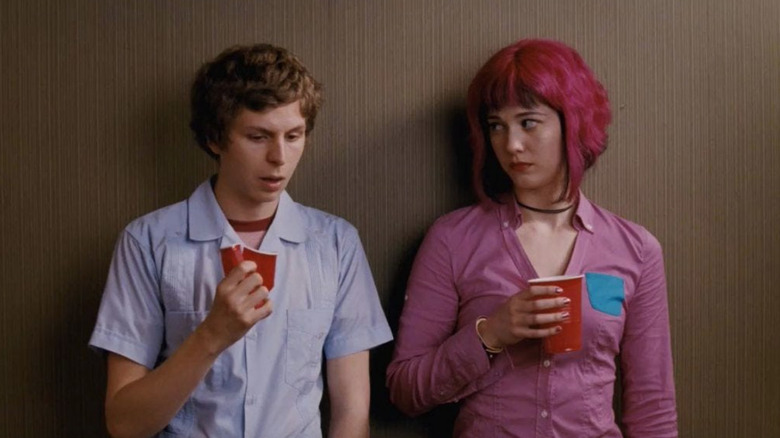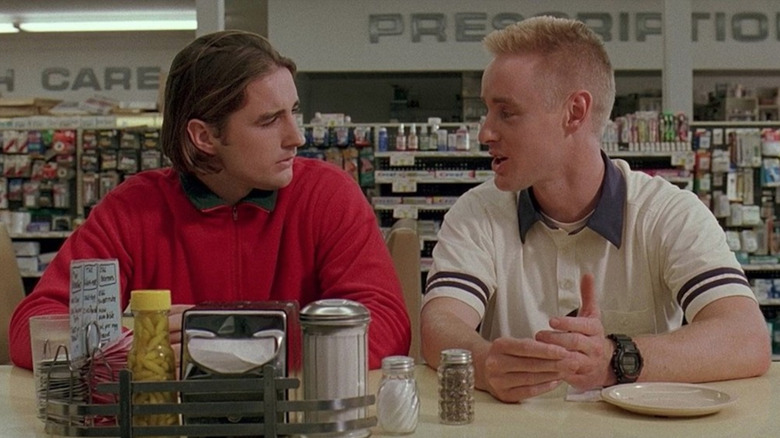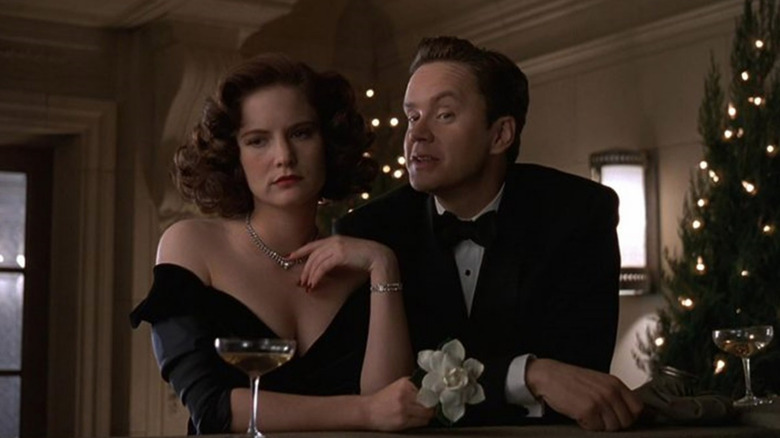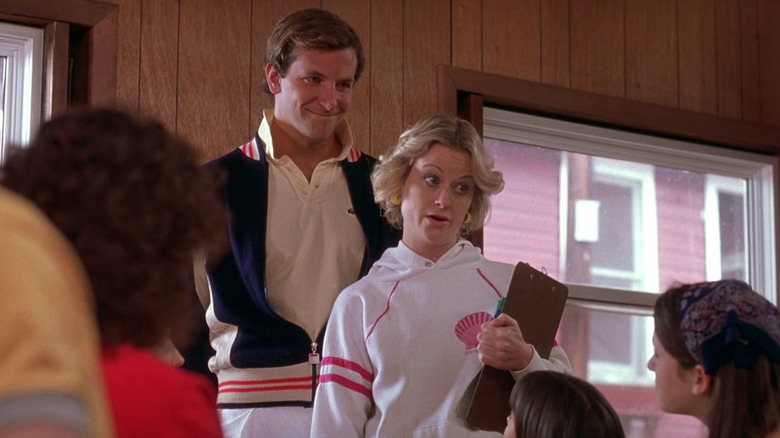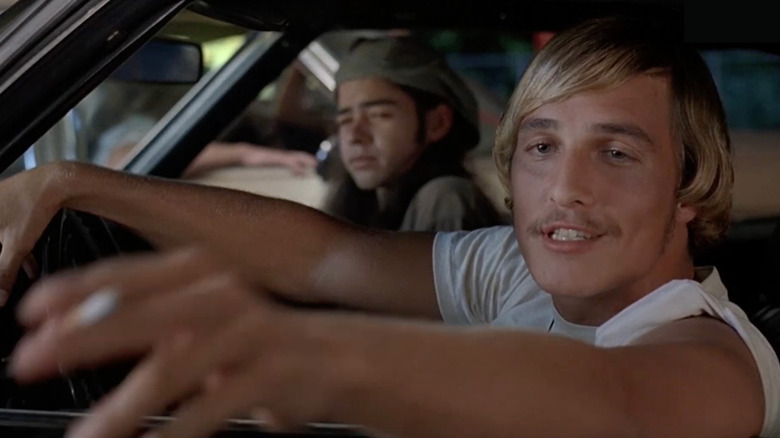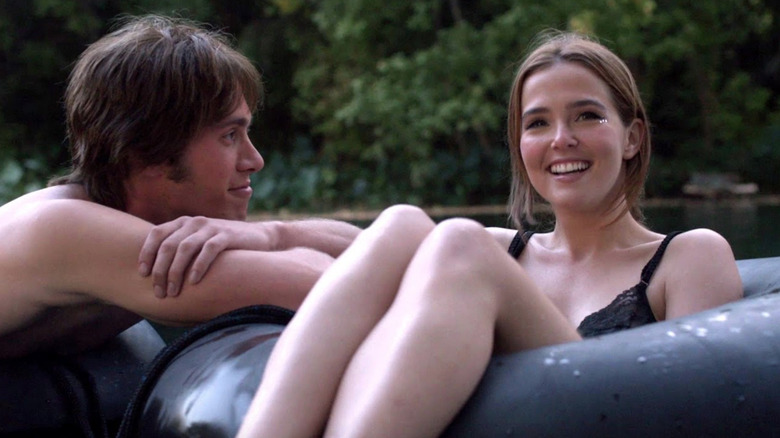Comedy Box Office Bombs That Are Actually Worth Watching
There can be several reasons why a movie bombs at the box office, including poor timing, ineffective marketing, and miscasting. Comedy films face additional hurdles in attracting audiences: We don't all find the same things funny, which can make it challenging for comedies to appeal to a wide demographic. However, despite a decline since their heyday in the '90s, comedies still rank among the top-selling genres in total box office sales.
That being said, box office numbers aren't the sole measure of a film's success. Many movies that were considered financial failures have gone on to find second lives through home media and streaming platforms, sometimes gaining cult followings along the way. In fact, some of the most memorable comedy classics initially stumbled at the box office, only to rise to prominence later on.
These cinematic underdogs, once dismissed as failures, have since earned high praise on review platforms like Rotten Tomatoes, Metacritic, and IMDb — a reminder that a film's true worth can transcend its initial reception.
Hot Rod (2007)
When a feature comedy script originally intended for Will Ferrell during his "Saturday Night Live" days found itself stuck in development hell, Lorne Michaels convinced Paramount to let the hot-off-the-internet comedy group "The Lonely Island" take over, with Andy Samberg as the star and Akiva Schaffer as director. Samberg (who plays Rod Kimble, an amateur stuntman who is hilariously accident prone) acknowledged the likelihood of "Hot Rod" being misunderstood, telling New York magazine, "My favorite movies, almost across the board, are not the biggest box-office hits." But that didn't stop the comedy group from staying true to themselves. The film ultimately grossed less than $14 million at the domestic box office against a $25 million budget.
The disappointing numbers and mixed reviews suggested audiences weren't quite ready for Samberg's unique brand of internet-age, absurdist humor on the big screen. However, Lorne Michaels foresaw the inevitable evolution of both critic and audience perspectives over time, telling Paper, "Critics just don't like new comedians, and they certainly don't like them if they come from 'SNL' or television. Later on, they revise their opinions and say that so-and-so's later films aren't as good as the first ones. I think the picture will be thought of differently in two years." Following its arrival on Netflix, "Hot Rod" finally discovered its devoted fanbase and was recognized for its comedic brilliance.
Bros (2022)
Following the dismal opening weekend of the romantic comedy "Bros," which fell short by half of its projected profits across more than 3,300 theaters, writer and star Billy Eichner voiced his disappointment on X (formerly known as Twitter), attributing the underperformance to a lack of attendance from straight audiences. "Even with glowing reviews, great Rotten Tomatoes scores, an A CinemaScore etc, straight people, especially in certain parts of the country, just didn't show up," Eichner wrote.
While this may have been a factor, the film — a love story about a podcast host and a lawyer who both have serious commitment issues – was hindered in other ways. Forbes pointed to poor marketing ("The initial theatrical trailer was self-congratulatory and not funny") while Variety blamed the lack of bankable actors ("The star power just wasn't there"). It's also necessary to acknowledge that romantic comedies, regardless of LGBTQ+ focus, often struggle at the box office.
If you were one of the many who didn't catch "Bros" in theaters, then you missed out on one of the best romantic comedies of the 2020s so far. Beyond its groundbreaking representation, "Bros" delivers the laugh-out-loud humor and genuine heartfelt emotion you expect from the best rom-coms. Let's hope that the film's overwhelmingly positive reception encourages Hollywood to continue pursuing diverse romantic comedies in the future.
Are You There God? It's Me, Margaret (2023)
The coming-of-age dramedy "Are You There God? It's Me, Margaret" is about a girl who is struggling to accept that she has to leave her old life in New York City behind after her father receives a promotion and moves the family to New Jersey. She begins talking to God about her issues, but, as the child of an interfaith marriage (her mother is a Christian and her father is Jewish), this proves a little tricky for her.
The film, which is adapted from Judy Blume's beloved 1970 novel of the same name, had a terrible time at the box office, grossing just over $20 million despite costing around $50 million after marketing costs. Blume's novels have sold over 90 million copies and the film has a solid ensemble cast, so what went wrong? While it managed to draw in people who grew up reading the original book, the film failed to resonate with the crucial teenage demographic: According to Comscore and Screen Engine exits (via Deadline), a mere 6% of ticket buyers were between the ages of 13 and 17.
It's regrettable that the film didn't manage to attract a younger audience, especially considering its sensitive exploration of themes like friendship and self-discovery. "Are You There God? It's Me, Margaret" courageously confronts the complexities of adolescence while delivering valuable life lessons in a relatable and authentic manner, and Abby Ryder Fortson (best known for playing Ant-Man's daughter Cassie Lang in the Marvel Cinematic Universe) is great as Margaret. Bursting with wisdom and authenticity, "Are You There God? It's Me, Margaret" could well become a YA classic for a new generation.
Lars and the Real Girl (2007)
Following his Academy Award nomination for best actor for his performance in "Half Nelson," Ryan Gosling began to garner greater recognition as a serious actor. His subsequent film, the dramedy "Lars and the Real Girl," cemented his credentials. He plays Lars, who develops haphephobia (a fear of being touched or touching others) after growing up with the knowledge that his mother died while giving birth to him. In his adulthood, he forms a relationship with a lifelike doll ordered from an adult site. The film is a touching tale about how his family, colleagues, and neighbors all pretend that the doll (who he names Bianca) is real on the advice of Lars' doctor.
"Lars and the Real Girl" enjoyed a limited theatrical run, reaching a maximum of 321 theaters. Despite falling just short of recouping its $12 million budget worldwide, it garnered widespread acclaim from both critics and audiences. The movie was praised for its sensitive handling of its unconventional premise, which could have easily veered into one-note territory. Striking a delicate balance between humor and heart, the film's genuine exploration of themes like loneliness, mental health, and community support makes for a one-of-a-kind and thought-provoking viewing experience.
Idiocracy (2006)
Mike Judge's "Idiocracy" stars Luke Wilson as Joe Bauers, a man who is deemed to be the "most average individual" in the U.S. military. As a result, he is chosen for an experiment and put into hibernation. When he awakens in 2505, he finds that America has become an anti-intellectual dystopia fuelled by overconsumption. While the film is widely seen as a cult classic these days, it didn't do very well at the box office when it dropped back in 2006, making just $495,303.
Much of the film's failure can be blamed on the studio. "Fox didn't screen it for critics, ran no print ads or trailers, and dumped it on 130 screens nationwide," The Guardian reported. Still, the people who did see it had generally positive things to say about the film's scathing satire. Even Tom Rothman, who was head of Fox's film division at the time and oversaw the release of "Idiocracy," admitted that mistakes were made. "'Idiocracy' is entirely my fault," he told The New York Times eleven years after the film's release, adding that it's "absolutely terrifyingly prescient."
Tenacious D in The Pick of Destiny (2006)
"Tenacious D in The Pick of Destiny" stars Jack Black and Kyle Gass as fictional versions of themselves. The film, which tells the (quite obviously made-up) origin story of the real-life musical duo Tenacious D, is a one-of-a-kind musical comedy that didn't get the recognition it deserved until years later. Despite its conservative budgeting — Black took a huge pay cut and the production costs were less than $20 million – the film flopped at the box office, grossing less than $14 million worldwide.
While Black took home much less than usual, the payoff was that he was given creative control of the project. The film was tailored to Tenacious D's devoted fan base, and, despite feeling "devastated" about its poor performance at the box office, Black is proud of the movie. "Just because something doesn't get 100% on Rotten Tomatoes, and zero people go to see your movie, doesn't mean that it has to be the end of the story," he told GQ. "If you love the work, that's all that really matters because it can find an audience further down the road."
Inherent Vice (2014)
The more unconventional the film, the harder it is to sell to a broad audience, which is essential for box office success. This is exactly why odd little films like Paul Thomas Anderson's adaptation of Thomas Pynchon's novel "Inherent Vice" rarely recoup their budgets, despite their quality. While "Inherent Vice" cost $20 million to make, it ended up grossing less than $15 million at the worldwide box office. However, the acclaimed film was far from a failure, with reviews going in its favor. After seeing "Inherent Vice" at its New York Film Festival premiere, one critic for the Los Angeles Times said that it had "the makings of a cult classic," and they were right.
While off-putting to mainstream viewers, the film's eccentric, disjointed narrative became the allure of its admirers. The trippy tale follows Larry "Doc" Sportello (Joaquin Phoenix) as a perpetually-stoned private investigator looking into the disappearance of his ex-girlfriend and her new partner in 1970s Los Angeles. It's a viewing experience unlike anything else while remaining faithful to its widely beloved source material. One of the best films of 2014, "Inherent Vice" continues to hold up more than a decade later and is definitely worth your time.
Scott Pilgrim vs. the World (2010)
Based on the turnout and enthusiasm displayed by audiences at the "Scott Pilgrim vs. the World" panel at San Diego Comic-Con, those involved likely expected a similar reaction for its theatrical release. However, the graphic novel adaptation, released alongside movies like "The Expendables" and "Eat Pray Love," disappointingly finished fifth in its opening weekend. In total, the film was unable to recoup its $60 million budget, making less than $48 million at the worldwide box office.
Even in retrospect, it's difficult to pinpoint exactly what went wrong. With critical darling Edgar Wright at the helm and boasting an ensemble cast of notable talent, "Scott Pilgrim vs. the World" appeared poised for triumph. It stood as a beacon of innovation, seamlessly blending comic book and video game aesthetics to forge one of the most original, stylistically creative comedies ever to exist. The simple answer is: "Scott Pilgrim vs. the World" was ahead of its time.
More than a decade later, the film — which is about a Toronto teen (Michael Cera) trying to defeat the evil ex-boyfriends of his crush Ramona (Mary Elizabeth Winstead) – has become a cult classic. It has also spawned a successful Netflix anime series called "Scott Pilgrim Takes Off," which is considered canon. Both the film adaptation and the anime series are must-sees for fans of the original graphic novels by Bryan Lee O'Malley, and for lovers of comedy in general.
Bottle Rocket (1996)
Wes Anderson's critically acclaimed feature debut "Bottle Rocket" is responsible for launching his career along with the careers of the film's leads, brothers Owen and Luke Wilson, who star as friends who try to become criminals with hilarious results. Originally a short film screened at the 1994 Sundance Film Festival, Anderson's "Bottle Rocket" caught the eye of filmmaker James Brooks, who backed a full-length version of the short. Despite a modest budget of $7 million, the film struggled commercially, earning a mere $560,069 during its limited theatrical release. Owen Wilson revealed to Maxim magazine that the financial failure of the picture almost led to him pursuing his plan B — joining the Marines.
Today, Anderson's talent is widely acknowledged, and delving into the origins of his artistry is akin to unearthing a time capsule. "Bottle Rocket" contains many of Anderson's trademark aesthetics, offering a must-see glimpse into the genesis of his style. And, if you're still hesitant, perhaps you'll be persuaded by Martin Scorsese, who hailed "Bottle Rocket" as one of his favorite films from the 1990s. He commended Anderson in an Esquire op-ed, writing that he "knows how to convey the simple joys and interactions between people so well and with such richness. This kind of sensibility is rare in movies." Now, that's an endorsement.
The Hudsucker Proxy (1994)
One of the Coen brothers' most overlooked films, "The Hudsucker Proxy" stars Tim Robbins as a business school graduate who is made president of a manufacturing company as part of a stock scam. It's a postmodern take on the classic "big business" films popularized in the 1940s and '50s. Following on from "Blood Simple," "Raising Arizona," "Miller's Crossing," and "Barton Fink," people expected big things from "The Hudsucker Proxy," but the box office numbers told a different story. Against a $40 million budget, the film brought in less than $3 million in ticket sales. It was quite the blow for the brothers, but they were able to redeem themselves a few years later with the success of "Fargo."
Critics and audiences have come around to "The Hudsucker Proxy" over time, appreciating it for its bold artistic vision and clever humor. A reviewer for RogerEbert.com was one of many who recognized the film to be misunderstood, writing, "Released between featherweight trifles like 'Guarding Tess,' 'Monkey Trouble,' and a horde of sequels to long-running franchises, comedy like this was rare indeed. It worked three times as hard as its peers and never broke a sweat." The film eventually achieved the cult following it deserves and is definitely worth a watch if you love the Coen brothers' work.
Wet Hot American Summer (2001)
David Wain's "Wet Hot American Summer" is a summer camp-set comedy featuring future stars Paul Rudd, Bradley Cooper, and Amy Poehler, to name but a few. It premiered at the 2001 Sundance Film Festival but failed to attract a distributor, the first of many hurdles the film would soon face. Wain discussed the disappointing experience with Entertainment Weekly a decade later. "You could have heard a pin drop in the audience when we screened it," he said. Wain revealed that he eventually received a "lowball, ridiculous, insulting, pathetic offer" from USA Films. With no other options, he accepted. "It opened at the Empire [AMC] cinema in New York on 42nd Street, which has I think 25 screens and we were in number 25. It's like the little TV room next to the janitor's office."
The film made less than $300,000 in ticket sales, nowhere near its already frugal budget of $1.8 million. The limited reach was coupled with scathing write-ups from reviewers, with one Salon critic calling it "a thoroughly inept piece of moviemaking." Veteran critic Roger Ebert was also unimpressed, expressing his distaste through parody lyrics of Allan Sherman's "Hello Muddah, Hello Fadduh." Everyone hated it at the time, but, viewed through the lens of nostalgia, the film slowly gained a cult following. As "Wet Hot American Summer" reached more people through its DVD release, viewers fell in love with its absurdity and offbeat humor, and you will, too.
Dazed and Confused (1993)
Filmmaker Richard Linklater was becoming widely known on the independent film scene with early projects like "It's Impossible to Learn to Plow by Reading Books" and "Slacker." The 1970s-set comedy "Dazed and Confused" marked his transition to working within the studio system, something that proved challenging. Chronicling his experiences in a diary called "Dazed By Days," Linklater recounted the difficulties he encountered during the production. Clashes between Linklater's established crew and the studio's people created tensions on set, while executives pressured Linklater to implement changes he deemed unnecessary or detrimental to the film's vision. Crucially, Linklater had limited control over the film's marketing strategy, adding to the strain of the collaboration.
All this and more led to the film's eventual box office failure: It grossed $8.1 million against a budget of $6.9 million. Still, looking past the studio's influence, critics appreciated "Dazed and Confused" for what it was: A nostalgic and authentic portrayal of the high school experience. Writing in his diary before the film's release, Linklater made peace with the final product. "I find some Zen moment in here somewhere — there will be rather lame marketing and then there will be film for all time — ready to reach whatever audience feels disposed to find it." And find it they did. After a successful home media release, "Dazed and Confused" went down in history as the quintessential coming-of-age comedy.
Everybody Wants Some!! (2016)
Richard Linklater's teen comedy "Everybody Wants Some!!" follows a group of college baseball players in 1980s Texas. Linklater has called it a "spiritual sequel" to "Dazed and Confused," and the two films are alike in more ways than one: Despite the lessons learned from the underwhelming box office reception of "Dazed and Confused," audiences were hesitant to embrace the film during its theatrical release. With a worldwide box office gross of less than $5 million against a $10 million budget, it appeared that history was repeating itself.
Once again, factors beyond Linklater's control seemed to be at play. Studios displayed reluctance from the outset, and audiences mistakenly overlooked the film. Yet, despite these challenges, critics unanimously recognized the movie's merit — "Everybody Wants Some!!" was met with universal acclaim. While the film's commercial success may have fallen short of expectations, its critical acclaim solidified its status as a noteworthy addition to Linklater's filmography.

